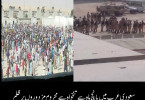Labour Laws Archive

سعودی عرب میں پانچ ماہ سے تنخواہ سے محروم مزدوروں پر ظلم: کربلاء کی ایک جنگ عرب ٹیک کمپنی کے ساتھ مزدور سعودی عرب میں لڑرہے ہیں ، ان میں پاکستانی محنت کش بھی شامل ہیں ، ان محنت کشوں کو عرب ٹیک کمپنی نے پانچ ماہ سے تنخواہ نہیں دی

Labour rights and Election 2013: Pakistan is one of the largest countries with respect to its labour force. More than 40% of labour force belongs to agriculture, around 20% in industry and rest to other services. It is a shame that farmers, fishermen, ordinary

490 years of jail sentences for labour leaders in Pakistan – by Farooq Tariq: Note: Pakistan is a country where Jihadi-sectarian terrorists such as Malik Ishaq, Hafiz Saeed, Qari Hussain etc are routinely acquitted, while tough sentences are reserved for poor labourers. On November 1, a protest demonstration and rally was held in

Spending on our Human Resource – by Naveed Ali: The Pakistan Institute of Labor Education and Research’s (PILER) report of 2010, first published in July 2010, is a very important report (1). It sheds light on the real issues Pakistanis face today; a pity to observe parliamentarians, politicians

Violation of Labour Laws in Pakistan – by Shaukat Masood Zafar: Under the 1973 Constitution labour is defined as a ‘concurrent subject’ making liable for implementation both the Federal and Provincial Governments. The Industrial Relations Ordinance makes provision for the appointment of a Collective Bargaining Agent (CBA) to determine the

Plight of Pakistan’s informal workforce — by Syed Mohammad Ali: Given Pakistan’s currently tenuous economic and security situation, coupled with increasing unemployment, more women and children will join home-based work, which is not regulated and where remuneration is extremely low

The PPP government’s new labour policy 2010 – by Abdul Nishapuri: Consistent with its election manifesto, the PPP government has finally taken a step in the right direction by announcing a new labour policy (effective 1 June 2010). The policy comprises a number of appreciable elements in order to protect

Pakistani labourers’ fair demands – by I.A. Rehman: Since it is not possible to push a new bill through parliament in two days the government has only two options. It may have the proposed new legislation issued as an ordinance or take refuge under the oft-criticised subterfuge

Communist Mazdoor Kissan Party (CMKP) to announce new constitution: LAHORE: The Communist Mazdoor Kissan Party (CMKP) has announced that it will soon introduce a new constitution for the party along the basic principles of Marxism, CMKP Additional Secretary Irfan Ali said on Monday. He said the CMKP were

PPP and the working class: President Zardari has signed the Services Tribunal (Amendment) Bill 2010, repealed the Removal from Service (Special Power) Ordinance 2000 and Section 2A of the Services Tribunal Act 1973, a controversial clause that deprived redress to employees as they were

President signs services tribunal amendment bill: The Pakistan People’s Party has its roots in the working class of the country. Zulfiqar Ali Bhutto envisioned a Pakistan where the Labor Class could live with dignity and honor. Mohtarma Benazir Bhutto durgin her governments pursued extensive agendas
